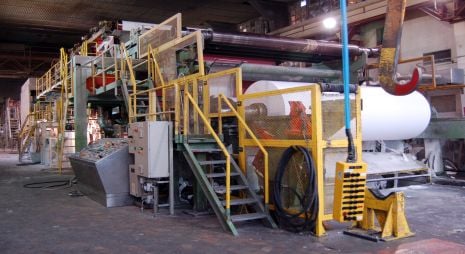 Introduction to Pulp and Paper Technology Course
Introduction to Pulp and Paper Technology Course
Introduction to Pulp and Paper Technology Course
St. Petersburg, Florida
Monday, January 12, 2026 to Thursday, January 15, 2026
Course Dates: January 12-15, 2026
This four-day course delivers the most comprehensive introductory/intermediate overview available in the industry covering all of today's pulping and papermaking technology.
You can gain an in-depth overview of the entire pulp & paper mill’s major processes, including:
- Wood & Fiber Raw Materials
- Paper Mill Refining
- Pulping
- Pulp Processing, including Bleaching
- Wet End Additives
- Paper Machine Operations
- Chemical Recovery Overview
- Coating
- Recycling
- Environmental Control
Attendees learn more in this short course than at any other comparable training. Review the detailed Course Schedule to see for yourself.
The curriculum is comprehensive and covers everything from the incoming wood and chips, pulp mill operations, chemical recovery, recycling, stock prep, paper machine operations, pulp and paper quality, and environmental topics.
Learning Outcomes
- Demonstrate overview knowledge of mill operations, products, process variables, equipment, and terminology.
- Describe examples of how one part of the mill affects another.
- Explain the importance of thinking on a mill wide basis.
- Discuss how the pulp and paper processes affect product properties and quality.
Evaluations after this course result in consistently high ratings for the learning outcomes with 97 percent reporting that the training is good to excellent.
Huge Collection of Visuals
This course utilizes a unique collection of visuals, which includes the visuals from the new 4th Edition of the Handbook for Pulp and Paper Technology by Gary Smook, which we use as the course textbook.
The curriculum corresponds with every chapter within that book for enhanced learning. You get to keep your course copy of "The Smook Book" as it's often called at the end of the course.
The total experience, plus the instructor's enthusiastic teaching style and knowledge of mill processes, has produced the result of the TAPPI Introduction to Pulp & Paper Technology being its longest running short course and consistently one of TAPPI's highest ranked courses.
Pre-Course Survey
Each year, this course is customized to each class of attendees, with diverse backgrounds and interests, using a pre-course survey. Content and discussion time is adjusted to accommodate topics of interest to you. In short, you'll get answers to your specific pulp and papermaking questions.
Questions not answered in class or the interaction sessions are referred to other industry experts.
COURSE CONTENT
The TAPPI Introduction to Pulp & Paper Technology Course offers both introductory- and intermediate-level content covering technology, including “what” happens, and “why” things happen.
Introductory-Level Content (70%)
This course includes introductory-level topics that include:
- Vocabulary and overviews of processes and technology
- Equipment overviews and descriptions
- Product properties and effects of processes
- Effects of one part of the mill on other parts
- Environmental control
Intermediate-Level Content (30%)
This training presents various process variables, the “why things happen,” and provides a needed foundation for the advanced-level topics below.
Advanced-Level Content (0%)
The curriculum does not include process and equipment training in depth; process control, PID diagrams; mill-specific troubleshooting and optimization, runnability nor case studies, etc. These are topics for more advanced and specialized courses, but you'll gain the foundation for learning advanced topics more quickly.
Overall, You Will...
- Gain a broad perspective by exploring the entire pulping and papermaking processes.
- Increase your ability to contribute to improving mill operations.
- Get personalized answers to specific questions and operating problems.
- Learn how to interact more knowledgeably with other mill personnel.
Who Attends?
Attendees are a mix of new industry and new position people from mills, suppliers corporate, and organizations. They attend for a number of reasons, including:
- Gain an overview of the entire mill, plus specific areas of interest
- Refresh technical knowledge
- Think on a mill-wide basis
- Better understand the effects of P&P processes on product quality
INCLUDED WITH YOUR REGISTRATION
A Copy of the "Smook Book"
Included with your course fee is a copy of the valuable reference manual called the "Smook Book" or specifically titled, The Handbook for Pulp and Paper Technologists by Gary Smook. Thirteen years in the making, this manual is considered the must-have book for professionals in the pulp and paper industry and widely used by P&P companies, colleges and universities because it includes hundres of illustrations, charts and tables.
The Professional CertificateIncluded with the course fee is the exam where you can earn the newly developed TAPPI Professional Certificate for the Introduction to Pulp and Paper. This certificate exam assesses competence in the areas covered in this course and demonstrates you are ready to capably manage your industry’s demands.
Earning this certificate with a score of 80% or higher demonstrates you have gained significant introductory-to-intermediate knowledge of pulping and papermaking technology.
Professional Development Credits
You will earn 26 professional development hours or 2.6 Continuing Education Units (CEUs) for completion of this course. TAPPI's Professional Development department has been accredited as an Accredited Provider by the International Association for Continuing Education and Training (IACET).
TAPPI Members receive discounted rates for this course.
If you're not a member yet, we want you to join us!
Follow us and Learn More from LinkedIn
Need Custom Training on this Topic?
The content for this course can be tailored specifically to your company's needs and delivered by a TAPPI instructor onsite at your location or as virtual and blended learning formats.
With TAPPI Company Classroom, we’ll work with you to determine your training needs and develop a curriculum to match your objectives.
Contact us to get started.
Thomas Holm
Tom is the owner of Yggdrasil Pulp Consulting LLC, providing process analysis, capital justification assistance, and training services to the Pulp and Paper Industry. He worked with Buckman International as a global subject-matter expert in pulping and related processes. During his six year tenure, he worked with Sales Associates and their customers in 19 countries. He is the author of a series of global webinars discussing various facets of the pulp industry from pitch control to bleaching enzymes. He has authored several papers and made presentations for World Pulp and Paper, TAPPI, Pulp and Paper Canada, ABTCP and CIADICYP.
He has taught introduction to pulping courses for customers and sales associates alike on five continents and has visited over 150 mills, roughly half of which were in North America. This is his fifth year as an instructor for TAPPI’s Introduction to Pulp and Paper short course.
Prior to joining Buckman, Tom worked for the Willamette mill in Hawesville, Ky., which eventually became Weyerhaeuser and then Domtar. After working as an intern at Hawesville in 1982, and two summers at the Red River Mill in Campti, La., he remained with the company after receiving his BS in Paper Science and Engineering in 1985 from the University of Wisconsin-Stevens Point. He held various positions at the Hawesville site including a four-year stint as the technical manager of the Kentucky Medium mill until its closure, when he returned to the pulp mill management team. He also managed the corporate PSM audit team and served as the first chair of the Domtar corporate Fiberline manager’s roundtable. He was involved in four Fiberline startups, as well as one recovery boiler startup.
In addition to consulting, he is currently the Chairman of the board of directors for the Perry County Port Authority and Hoosier Southern Railroad. Southern Railroad.
Dan Denowski
Dan is employed by EnzyPro, marketing enzymatic solutions to the Pulp and Paper industry. He also works for ResourceWise, keeping their FisherSolve paper industry database current. He was employed by Buckman for 24 years as a subject matter expert in packaging, first in the US then globally. During his tenure, he worked with sales associates and customers in over 30 countries, working on or around over 800 paper machines, including three new papermachine startups. He has authored several papers and presentations for World Pulp & Paper, TAPPI, ASEAN Paper, and Pulp & Paper Canada on topics such as dry strength, sizing, enzymatic strength, and approaches to maximizing recycled fiber quality. He managed a project to revise and then restart Buckman's sales and technical training curricula post-COVID.
After earning BS degrees in Paper Science & Engineering and in Chemistry in 1986 from the University of Wisconsin-Stevens Point, Dan worked for Badger Paper Mills in Peshtigo, Wisconsin for 16 years, in various positions; product development manager, technical director, wax plant manager, and manager of manufacturing. He also earned a MS in Management and Organizational Behavior from Silver Lake College in 2002.
He lives in Glade Park, Colorado and is on the board of directors for the Glade Park Community Services
Follow us and Learn More from LinkedIn
Earn 2.6 CEUs for completing this course!
DAY ONE
8:00 am - 5:00 pm
PULPING TECHNOLOGY
Overview of the Industry
- Industry trends, statistics and information sources
Wood and Fiber Raw Materials
- Wood and fiber source
- Differences between hardwoods and softwoods, and important fiber properties that affect paper properties
Preparation of Wood and Chips for Pulping
- Woodyard operations including debarking, chipping, screening, storage, and recovery
Overview of Pulping
- Primary categories, incl. chemicals and cooking conditions
- General pulping terminology
- Common pulp properties and tests
Kraft Pulping
- Major types of equipment used in pulping
- Overview of primary operations in the digesters
- Major pulping variables
- Overview of some major kraft pulping trends
Mechanical and Semi-Chemical Pulping
- Primary mechanical pulping processes
- Mechanical vs. chemical and hybrid pulp properties
Networking Hour with Refreshments
DAY TWO
8:00 am - 5:00 pm
Pulp Processing
- Overview of fiber line pulp processing including washing, screening and cleaning
- Major equipment types and key operating variables
Bleaching
- Bleaching processes, including oxygen delignification, chlorine dioxide, caustic extraction, peroxide, and other
- Bleaching equipment, chemicals, and reactions
- Trends and environmental issues
Recycling
- Categories of recycled paper and board
- Types of contaminants with recycled paper and problem
- Overview of different operations and equipment involved with contaminant removal
Chemical Recovery
- Overview of the major recovery operations, including evaporation, combustion, and recausticizing
- Composition and properties of black liquor and what happens in the evaporators and recovery unit
- How pulping liquor is regenerated in recausticizing
- Lime kiln operations at an overview level
DAY THREE
8:00 am - 5:00 pm
PAPER TECHNOLOGY
Introductions to Paper Grades and Properties
- Important paper and board properties and tests, including strength, optical and printing properties
Paper Mill Stock Preparation
- Refining process, primary effects on fibers, and the effects of refining on paper machine operations and paper properties
- Primary additives used in paper, including strength adhesives, pigments, sizing, and retention aids
Paper Machine Wet End Operations
- Stock approach system operations prior to the paper machine
- Main types of headboxes in papermaking and internal ops
- Sheet forming process, slice operations, jet to wire effects, fiber orientation, formation, microturbulence, dewatering, and sheet structure variations
- Sheet forming operations and paper properties
- Forming fabrics, save alls
- Twin wire gap formers, varieties, mechanisms of dewatering, and sheet structure
DAY FOUR
8:00 am - 4:00 pm
Pressing
- Types of press section configurations and press nip
- What happens to the sheet during pressing
- Pressing variables and trends
Drying
- Overview of dryer can internal operations with steam and condensate, major water removal rate differences, major equipment & operating variables that affect rate of drying
- How drying and sheet shrinkage affect paper and board properties; and the role of felts, draw, and sheet restraint
- Overview of tissue machine yankee drying and creping
Calendering and Winding
- Different types of calenders
- Sheet properties, examination of major calendering variables
- Winding and roll finishing operation overview
Surface Treatments
- On machine size press operations, including equipment types and the variables that affect starch pick up in the size press
- Primary components in a coating, including pigments, adhesives, and additive
- Differences between roll, air knife, and blade coater
- Coating drying, equipment and mechanism, supercalendering
Environmental Control
- Overview of primary and secondary effluent treatment
- Review of air & water environmental issues associated with the P&P processes
Mill Services
- Steam Systems
- Water Systems
New Topics:
- Addressing the Recycling Crisis
- Decreased exports
- Effect of E-commerce of boxes shipped to homes. - Mill Wide Energy Optimization
- Papermaking Best Practices
Follow us and Learn More from LinkedIn
|
On or Before December 22, 2025
|
After December 22, 2025
|
|
|
Meeting Registration
|
||
|
Member
|
$2,210
|
$3,532
|
|
Join or Renew and Save
|
$2,448
|
$3,772
|
|
Young Professional under 30 Join or Renew and Save
|
$2,370
|
$3,691
|
|
Nonmember
|
$3194
|
$5,554
|
|
|
$0.00
|
$0.00
|
|
Group Meeting Registration, per person (3+ people from the same location)
|
||
|
Member
|
$1,646
|
$3,035
|
|
Join or Renew and Save
|
$1,883
|
$3,273
|
|
Young Professional under 30 Join or Renew and Save
|
$1,809
|
$3,199
|
|
Nonmember
|
$2,455
|
$4,436
|
Payment Policy
TAPPI requires that all registration fees are paid in full prior to the start of the course. Attendees paying by check will be registered for the course only after the payment has been received.
Cancellation Policy:
If you find that you have to cancel, your full registration fee will be refunded if TAPPI’s Registration Department receives written notification (fax acceptable at +1.770.209.7206 by (December 15, 2025). Please note: There will be a 50% refund for all written cancellations made after (December 15, 2025) but no later than 5 business days prior to the start of the course (January 7, 2026). Understandably, after January 7, 2026, no refunds can be issued. Substitutions, however, will be accepted any time without a penalty.
Refund:
100% - Cancellation received by (December 15, 2025)
50% - Cancellations received after (December 15, 2025) and no later than (Jan. 7, 2026).
NO REFUND- Cancellations received after (Jan. 7, 2026).
Follow us and Learn More from LinkedIn
Course Dates: January 12-15, 2026
TAPPI Introduction to Pulp and Paper Technology Course
The course will start at 8:00 am on Monday and conclude at 4:00 pm on Thursday.
TAPPI has negotiated special hotel rates, often with special amenities and/or discounts. You don't want to miss out on these; rooms outside our block may be much more expensive and will not include special offers. If you utilize a travel agent or company travel department, please let them know about the procedures.
Course Venue:
The Hilton St. Petersburg Bayfront Hotel
333 First Street South
St Petersburg, FL 33701
Hotel Rates + Taxes and Fees: $209 + 13% tax
Reservations:
- Hotel Direct: 1-800-944-5500
- Brand Reservations: 800-HILTONS (800-445-8667)
Book your room at the course venue
Individuals must identify themselves as being with the group, 2026 TAPPI Course Platform
Note: The TAPPI group rate at the Hilton St. Petersburg expires Monday, December 27, 2025
After the Special Rate hotel deadline, you may need to consider alternative hotels in the area, which include:
- Ponce de Leon Hotel
- Hollander
- The Mansion House
- Hotel Indigo St. Petersburg
- Courtyard by Marriott St. Petersburg Downtown
- Hampton Inn St. Petersburg Downtown
Avis offers special discounts off regular rates for participants. To reserve your car, call 1-800-831-8000 and refer to the code AWD: #U226600.
Book Your Room Online
Call to Reserve
-
Hotel Direct: 1-800-944-5500
-
Brand Reservations: 800-HILTONS (800-445-8667)
Individuals must identify themselves as being with the group, 2026 TAPPI Course Platform
Publications for 2026 Intro to Pulp & Paper Course Attendees
Most titles are offered at a “course only” 15% discount. Purchase with your registration, pick up on-site at the course, and save on shipping!
Papermaking Science and Technology Series
Follow us and Learn More from LinkedIn
Blown and Cast Film Extrusion Course
Tuesday, March 24, 2026

2026 Introduction to Wet End Chemistry Course
Tuesday, June 02, 2026

